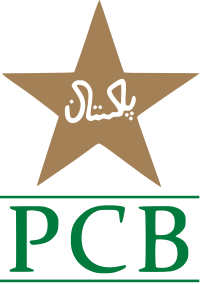 The Pakistan Cricket Board is a sporting organization that is responsible for governing all professional cricket including Test cricket and One Day International matches played in Pakistan. It controls and organizes all tours and matches undertaken by the Pakistan national cricket team.
The Pakistan Cricket Board is a sporting organization that is responsible for governing all professional cricket including Test cricket and One Day International matches played in Pakistan. It controls and organizes all tours and matches undertaken by the Pakistan national cricket team.Following the establishment of Pakistan as an independent state of the British Empire in 1947, professional and amateur cricket commenced the same year as the local infrastructure had already been established when the country was part of India. Even so, it was not until 1948 that a Board of Control was formally instituted and matches were arranged informally until then. Pakistan was admitted to the International Cricket Council in July 1952 and has always been a full member, playing Test cricket. The team's first Test series took place in India between October and December 1952.
The Pakistan Cricket Board was inaugurated on 1 May 1948 as the "Cricket Control Board of Pakistan". and was soon renamed the Board of Control for Cricket in Pakistan or B.C.C.P. The first meeting held in the committee rooms of Lahore Gymkhana saw HE The Nawab of Mamdot made President and Chairman, with Justice A.R.Cornelius as one of three vice-Presidents.[1] The following year Cornelius became Chairman of the working committee, serving until he relinquished his connection with the Board in early 1953.
The working Chairman was always one of the 3 Vice-Presidents. In April 1957 Ayub Khan imposed three more new Vice-presidents (himself being one of them). Then between December 1958 and September 1969 the post of Vice-President disappeared.
The response to turmoil within the Board has on four occasions been to suspend the rules and appoint an Ad-Hoc Committee. The first Ad Hoc Committee was appointed in September 1960 and did not disband until May 1963 having created a new constitution. The President of Pakistan would now nominate the Board President who would in turn nominate the other members of the Executive Committee to sit for a period of three years. Representatives of the four provincial cricket associations and Government departments formed the Executive Committee.[2] The BCCP was re-organised in the 1970s and was headed by former cricketers, professional administrators and trustees, who were often businessmen. In November 1976 players' demands for increased salaries reached a crisis and the Pakistan Sports Board took over running the B.C.C.P.'s affairs. Long-serving President, the formidable Kardar, was in the thick of the dispute. The revolt against Kardar forced him to resign in May 1977 and led to a new Ad-Hoc Committee replacing the Board Council in 1978 running Pakistan cricket and again changing the constitution. Provincial Cricket Associations were eliminated and divisional and city CAs became members, giving most of the influence to the city Cricket Association of Lahore and Karachi.n 2010, following the Waldo finding controversy, and subsequent erroneous statements by chairman Ijaz Butt, the Pakistan Cricket Board is facing the threat of being suspended as a full member by the ICC. Prior to this, on October 12, the ICC held meeting with Butt to discuss his inflammatory statements about the ECB, where he claimed that English players were accepting payment to lose matches. However, the ICC has since made it clear that sanctions will be applied to the member, Pakistan,[citation needed] rather than an individual of its management. To avoid such embarrassing situation in future, the Pakistan Cricket Board has introduced a revised code of conduct for its players in line with recommendations made by the International Cricket Council for stricter implementation of anti-corruption laws. This ICC also stated that if the board didn't implement the laws then Pakistan could be looking at suspension from International Cricket.[4] The ICC subsequently released a press conference that included the ICC chairman Haroon Lorgat, Shahid Afridi and Ijaz Butt the ICC said that they had been happy with the work done so far by the PCB such as sigining new disciplinary contracts with the players and also placing in security and methods of tackling corruption [5]
No comments:
Post a Comment